Can I Be Allergic to Goldendoodles? (Truth)
According to researchers, approximately 10% to 20% of the world’s population has allergies to dogs and cats. So, if you’re among this group but love animals, you might be wondering if you can be allergic to Goldendoodles.
The answer is yes. Even though Goldendoodles have hypoallergenic properties, it’s possible to be allergic to them.

I’ll help you understand why hypoallergenic dogs aren’t a sure-fire way to prevent an allergic reaction and share tips for reducing the chances of you experiencing allergies around Goldendoodles.
The Low-Down on Hypoallergenic Dogs
There’s no such thing as a 100% hypoallergenic dog. That’s because dog dander, saliva, urine, and sweat are the things that cause humans to have a reaction to them. In fact, it’s the protein found within these excretions that spark allergies.
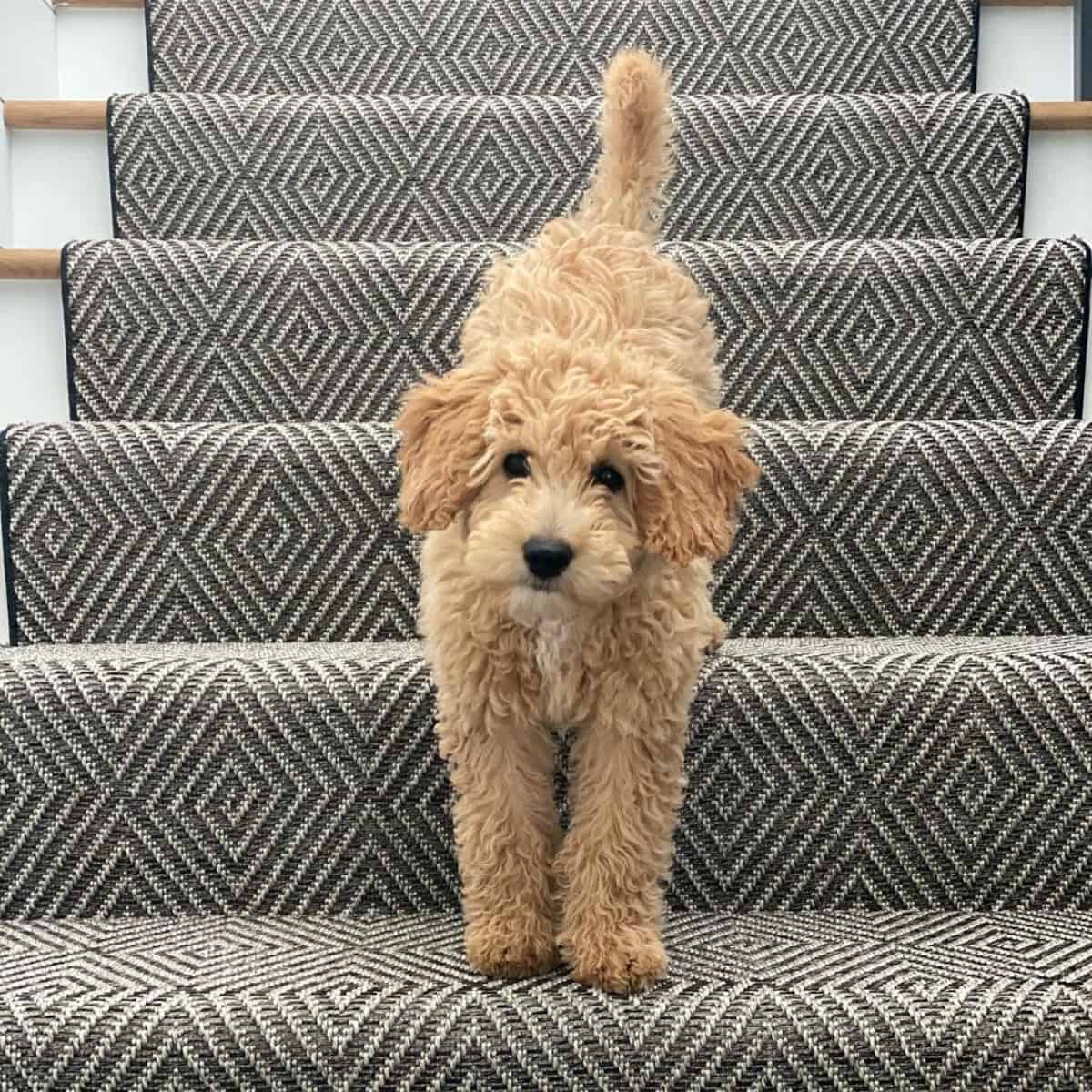
Obviously, you can’t stop any dog from urinating, drooling, or sweating. But the dander and dead skin that attaches to fallen dog hair often cause the most issues for people with dog allergies.
So, the theory is that since hypoallergenic dogs shed so little, there’s less of a chance that they’ll produce an allergic reaction.
There’s certainly truth to this, and luckily for people who love Poodles and Golden Retrievers, the Goldendoodle has hypoallergenic properties.
That doesn’t mean Goldendoodles never shed hair, though—all dogs shed. But the amount of hair they leave around the house is often much less than non-hypoallergenic dog breeds.
For this reason, the Goldendoodle is often, but not always, a good fit for people with dog allergies.
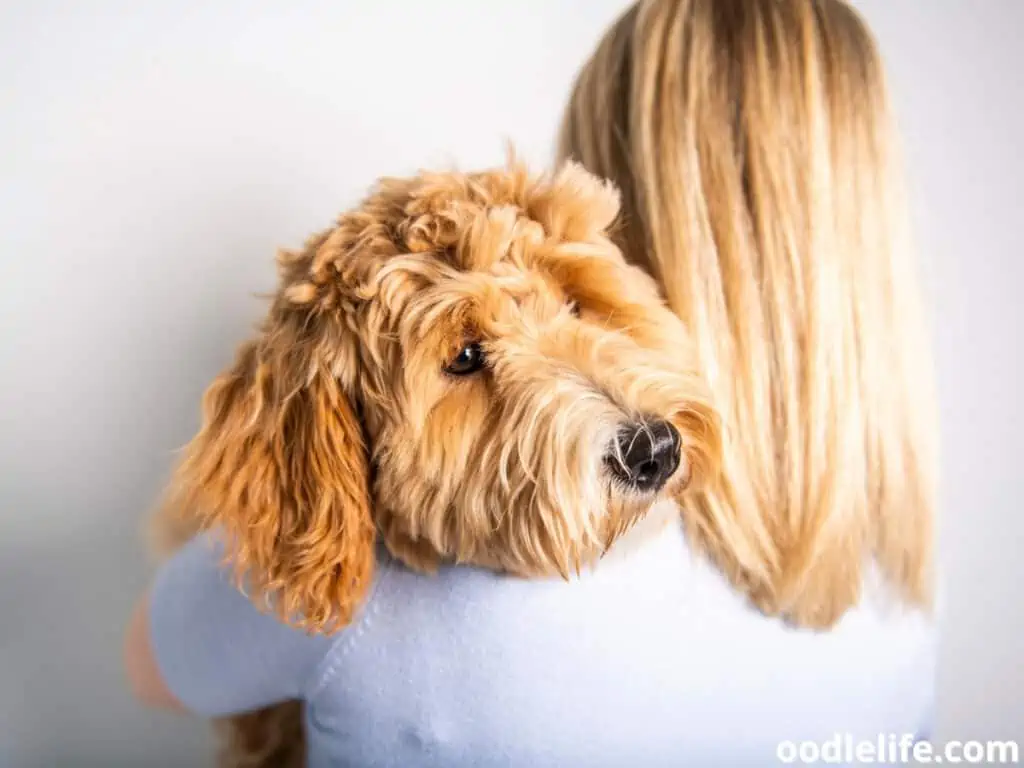
Examples of Pure Hypoallergenic Breeds
The Goldendoodle is a mixture of a purebred hypoallergenic dog (the Poodle) and a non-hypoallergenic dog (the Golden Retriever).
As a result, a dog allergy-prone person may have a higher chance of experiencing allergies from a Goldendoodle than a purebred hypoallergenic dog.
Some examples of purebred hypoallergenic dogs that breeders don’t cross with non-hypoallergenic dogs include:
- Poodle
- Maltese
- Schnauzer
- Bichon Frise
So, if you spend time around a Goldendoodle and have allergies, it’s worth hanging around one of these purebred hypoallergenic dogs to see if you don’t react.
As with hypoallergenic dog crosses like the Goldendoodle, it’s still possible to have an allergic reaction to a purebred hypoallergenic dog.
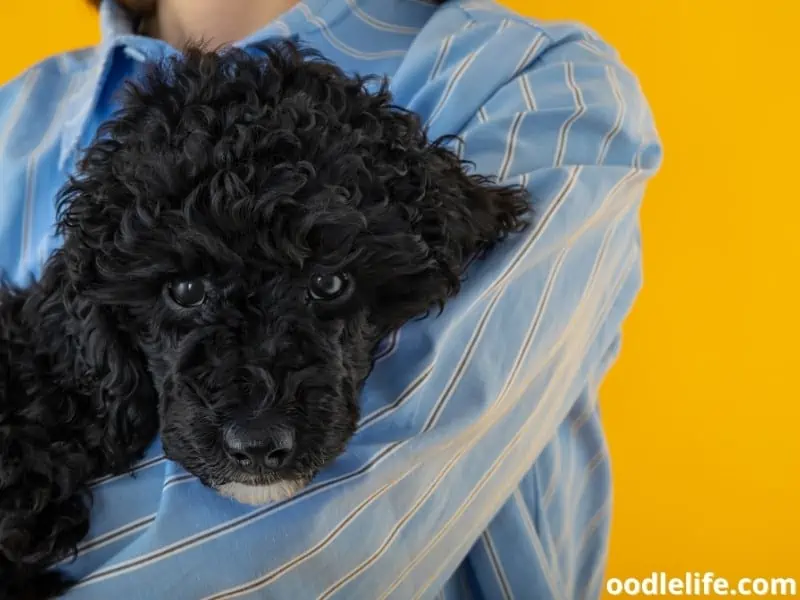
The Poodle’s Hypoallergenic Properties
There would be no hope of the Goldendoodle being hypoallergenic enough not to produce an allergic reaction if it weren’t for the Poodle.

Poodles have hair instead of fur. Like human hair, a Poodle’s hair grows continuously, dropping occasionally but not as much as, say, a Golden Retriever’s fur.
As you’ll soon learn, Goldendoodles may or may not have equal ratios of Poodle and Golden Retriever genes. So, the more Poodle a Goldendoodle has the more hair-like properties of their fur.
That’s promising news for people with allergies. However, you’ll need to take your Goldendoodle to the groomer for a hair trim on occasion. Doing so can also help reduce dander and dog allergens that can spark an allergic reaction.

Signs of Having Allergies to Goldendoodles
If you’ve been a sufferer of dog allergies for years, you don’t need me to tell you the signs that you’re allergic to Goldendoodles. However, people can develop dog allergies at any age, including adults.

So, if you have a hunch that you might be developing an allergy to your Goldendoodle, below are some signs:
- Cough
- Sneezing
- Itchy skin
- Nasal congestion
- Itchy, watery eyes
- Pressure around your face
In severe cases, you may develop asthma-like symptoms such as wheezing and difficulty breathing.
The reason for these symptoms is that your nasal passages become inflamed when they encounter the protein in Goldendoodle dander. Prolonged exposure to dogs in people with allergies can be harmful, as it can lead to sinus infections and asthma.
Therefore, I encourage you to visit a doctor if you suspect you have an allergy to your Goldendoodle.

What Goldendoodle Generation Is Best for Allergies?
The American Kennel Club doesn’t recognize the Goldendoodle as a purebred dog because there are so many variations in its genes, depending on the generation.

So, what does this mean for people with dog allergies?
The more Golden Retriever genes a Goldendoodle has, the higher the chance that you’ll have an allergic reaction. So, the Goldendoodles that people with allergies should avoid are:
- F1 Goldendoodle (50% Golden Retriever)
- F2 Goldendoodle (50% Golden Retriever)
- Reverse F1B Goldendoodle (75% Golden Retriever)
The F1 and F2 dogs are first-generation Goldendoodles, as they have an equal ratio of their Poodle and Golden Retriever parents’ genes.
But once breeders have the initial 50/50 Goldendoodle gene combination, they can take that Goldendoodle and breed it with a Poodle. Doing so increases the chances of a Goldendoodle taking on more hypoallergenic properties.
For this reason, the best Goldendoodle generations for people with allergies include:
- F1BB Goldendoodle (12.5% Golden Retriever)
- F2BB Goldendoodle (18.75% Golden Retriever)
- F1B Goldendoodle (25% Golden Retriever)
- F2B Goldendoodle (37.5% Golden Retriever)
I can’t emphasize this enough: Even if you purchase an F1BB Goldendoodle with only 12.5% Golden Retriever, you could still have an allergic reaction. And given the diversity in Goldendoodle genetics, it’s a dangerous assumption to believe that all Goldendoodles are allergy safe if you didn’t react to one dog.
For this reason, I encourage you to spend time with the specific Goldendoodle you’d like to bring home before doing so. That way, you’ll be able to see how your body reacts (and hopefully doesn’t react) to their dander.

4 Tips for Reducing Goldendoodle Allergies
If you already have a Goldendoodle and someone in your household appears to be developing allergies to them, you might not have to give them away (though you should always follow your doctor’s advice).
Instead, below are some strategies you can use to make your household a potentially habitable space for both the allergy sufferer and your Goldendoodle.
1. Buy a HEPA Air Purifier
HEPA stands for “high-efficiency particulate air,” and that’s what you’ll get by purchasing one of these filters. They do a stellar job of trapping the microscopic protein that your Goldendoodle produces in your home.
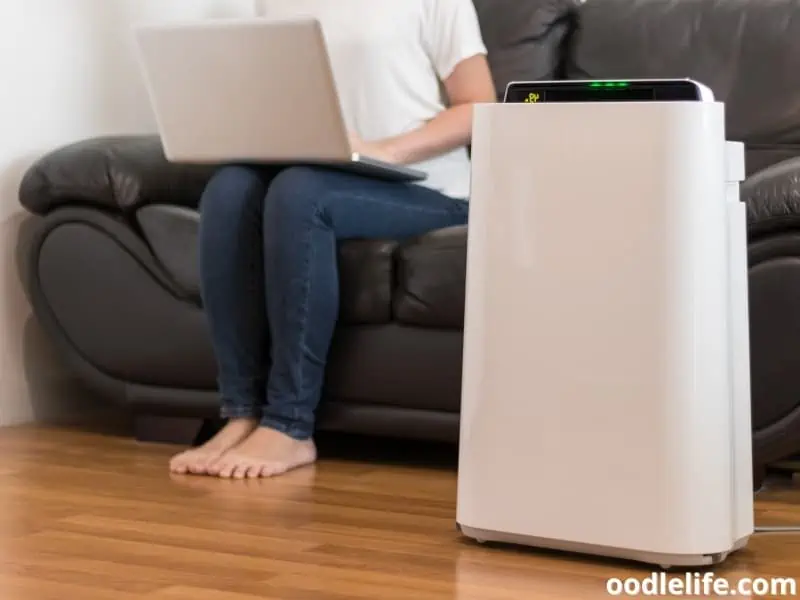
Did you know that even dry saliva can float in the air? A HEPA purifier will help take care of this issue. They come in many sizes, although you may need more than one to effectively reduce the amount of Goldendoodle allergy-inducing protein in the air of your various rooms.
2. Vacuum Regularly
Many people bring home a Goldendoodle because they don’t have to vacuum as much as if they owned a Golden Retriever. But if anyone in your household has allergies, keeping up with regular vacuuming can make or break how they feel around your pet.

Make sure the vacuum you purchase has a HEPA filter. That way, it’ll reduce the amount of allergy-inducing proteins it kicks into the air as you work.
3. Create No-Go Zones
Goldendoodles are loveable pets, so it’s hard not to invite them to cuddle on the couch and in bed with you. But if anyone in your house has allergies around them, this can create a challenging situation.

The more furniture and rooms your Goldendoodle has access to, the more they can leave dander and dried saliva behind. So, try keeping your dog to a specific portion of your house. And definitely keep them off any furniture that the allergy-prone person uses.
4. Keep Your Goldendoodle on a Grooming Schedule
Many people enjoy Goldendoodles because they typically don’t have to brush them as frequently as a Golden Retriever. However, letting your Goldendoodle go too long without grooming can negatively affect anyone suffering from allergies in your home.
Brushing your dog at least three times per week is best. Just make sure the person brushing them doesn’t have Goldendoodle allergies. Daily brushing is even more effective for preventing an allergic reaction if you have the time.
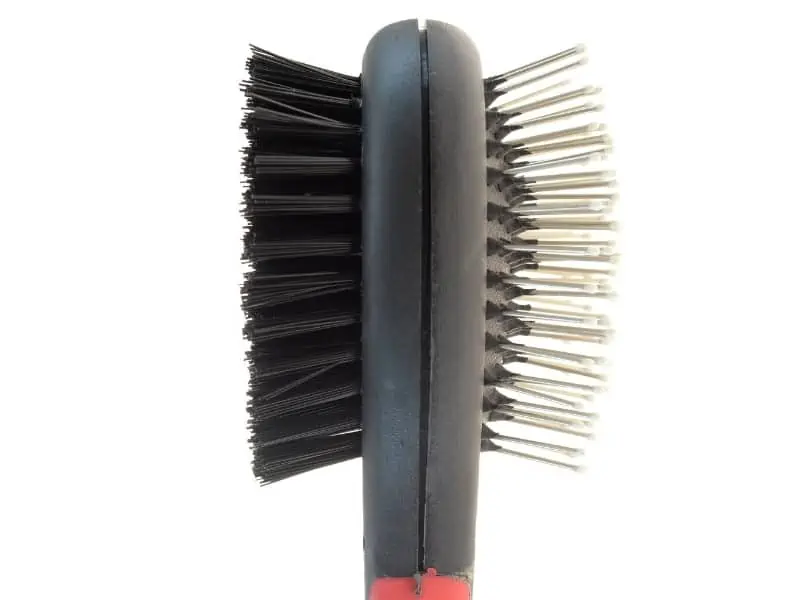
Bathing your Goldendoodle can also help reduce the amount of dander they leave around your home. But the trick is not to do so too often. Otherwise, it can cause their skin to dry out, creating an even bigger allergy mess by them leaving extra dead skin around your home.
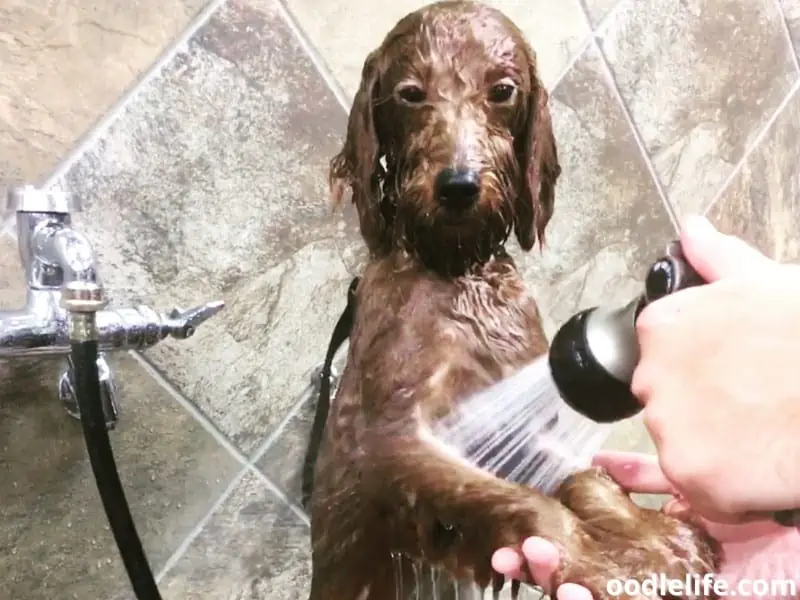
I recommend bathing your Goldendoodle no more than once per month, although once every two months is ideal for many dogs. Since every Goldendoodle is different, you’ll need to experiment to see what works best for them.
The Bottom Line
If you want to join the over 38% of households in the United States that own dogs but you have allergies, it’s possible that a Goldendoodle could be a good fit for you.
While some people will be allergic to Goldendoodles regardless, others can get away with not having allergies around them, particularly if they have a higher concentration of Poodle genes.
As a final reminder, it’s vital for anyone with dog allergies to spend time with the Goldendoodle they want to take home before doing so. That way, you’ll be able to get a feel for whether the dog will induce an allergic reaction, saving both you and the Goldendoodle heartbreak from having to part ways after living together.